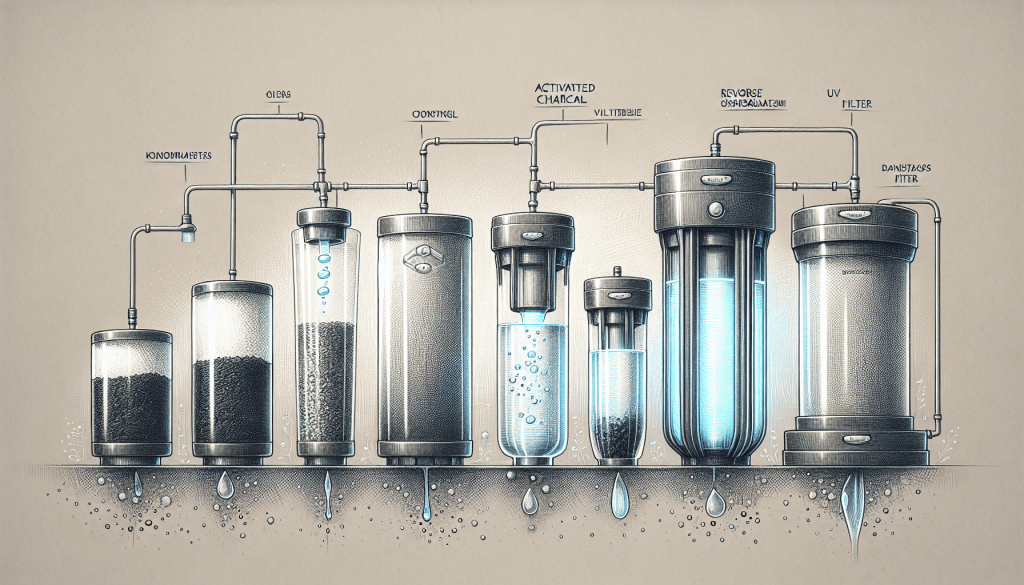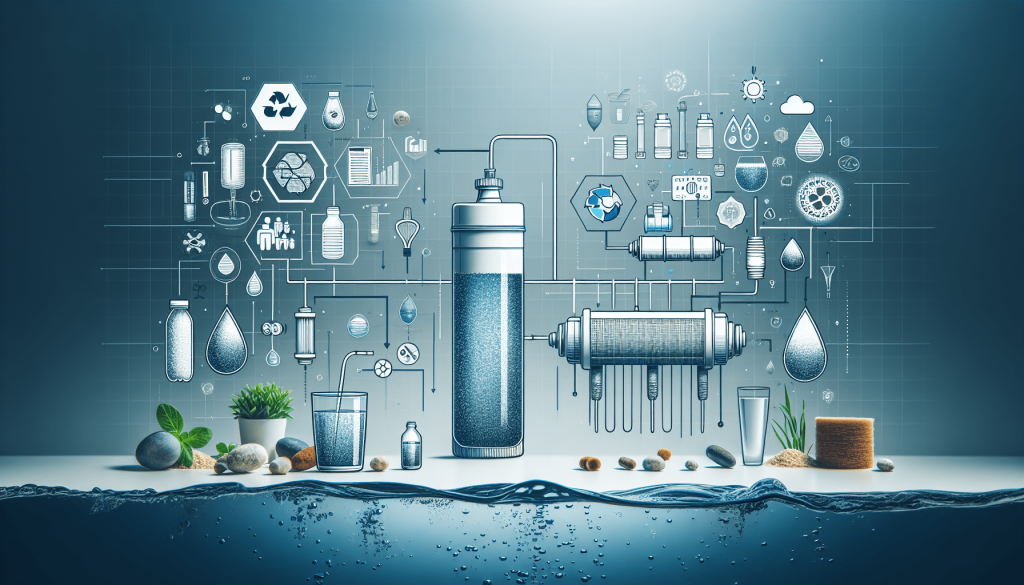If you’ve ever questioned which water filter is the ultimate champion in tackling polluted water, wonder no more! Every sip of fresh, clean water is a rejuvenating experience and choosing the right filter can make all the difference. In this article, we will explore various water filters and discover the ultimate solution to combat the challenges of polluted water. So, get ready to quench your thirst for knowledge and embark on a journey towards cleaner, purer hydration.
Reverse Osmosis Water Filters
Reverse osmosis water filters are a popular choice for individuals looking to have clean and purified drinking water. These filters work by using a semi-permeable membrane to remove impurities from the water. When you turn on the faucet, the water is forced through the membrane, which blocks contaminants such as bacteria, viruses, and chemicals. The filtered water then goes through a separate line, leaving behind the impurities in a concentrated stream of wastewater.
Advantages of Reverse Osmosis Water Filters
One of the main advantages of reverse osmosis water filters is their effectiveness in removing a wide range of contaminants. From heavy metals like lead and mercury to pesticides and other harmful chemicals, reverse osmosis filters excel at providing clean and safe drinking water. Additionally, these filters are capable of removing up to 99% of impurities, ensuring that you and your family have access to high-quality water.
Another advantage of reverse osmosis water filters is their convenience. Most systems can be easily installed under the kitchen sink, allowing you to have access to purified water whenever you need it. These filters also require minimal maintenance, typically only needing the membrane and filters to be replaced every 6 to 12 months.
Disadvantages of Reverse Osmosis Water Filters
While reverse osmosis water filters have numerous benefits, there are also a few drawbacks to consider. One of the main disadvantages is the amount of water wasted during the filtration process. For every gallon of clean water produced, reverse osmosis systems can produce anywhere from 2 to 4 gallons of wastewater. This can be a concern for individuals in areas with limited water supply or those who are trying to conserve water.
Another drawback is the removal of beneficial minerals from the water. Reverse osmosis filters not only eliminate contaminants but also strip away essential minerals like calcium and magnesium. While these minerals can be obtained from other dietary sources, some people prefer drinking water that still contains these minerals for their potential health benefits.
Despite these disadvantages, reverse osmosis water filters remain a popular choice due to their effectiveness in removing contaminants and providing clean drinking water.
Activated Carbon Filters
Activated carbon filters are another commonly used type of water filter. These filters are designed to adsorb impurities, such as chlorine, volatile organic compounds (VOCs), and certain pesticides. The carbon in these filters has a large porous surface area that allows it to trap and hold onto contaminants, preventing them from passing through.
Advantages of Activated Carbon Filters
One of the key advantages of activated carbon filters is their ability to improve the taste and odor of water. Chlorine, commonly used in water treatment, can create an unpleasant taste and smell. Activated carbon filters effectively remove chlorine, resulting in water that is more refreshing and enjoyable to drink.
Furthermore, activated carbon filters can remove some heavy metals, including lead, from the water. This makes them a valuable option for areas where the water supply may be contaminated with lead or other toxic metals. By reducing exposure to these harmful substances, activated carbon filters help protect your health and well-being.
Disadvantages of Activated Carbon Filters
While activated carbon filters offer many benefits, they do have some limitations. These filters are not as effective as reverse osmosis filters in removing certain contaminants, such as dissolved solids, fluoride, and bacteria. If your water source contains high levels of these substances, an activated carbon filter may not provide the level of purification you need.
Another disadvantage is the need for regular filter replacement. Over time, the carbon in the filter becomes saturated with contaminants, reducing its effectiveness. It is important to follow the manufacturer’s recommendations and replace the filter cartridges at the recommended intervals to maintain optimal filtration.
Despite these limitations, activated carbon filters are an affordable and widely available option for improving the taste and quality of your drinking water.

Ion Exchange Filters
Ion exchange filters work by replacing unwanted ions in water with other ions of the same charge. These filters use a resin that is charged with ions, specifically designed to remove certain contaminants from the water.
Advantages of Ion Exchange Filters
One of the main advantages of ion exchange filters is their ability to remove hardness from water. Hard water is characterized by high levels of minerals like calcium and magnesium. These minerals can cause limescale buildup in pipes and appliances, reducing their lifespan and efficiency. Ion exchange filters exchange the calcium and magnesium ions with sodium or potassium ions, effectively softening the water and preventing the negative effects of hard water.
Ion exchange filters are also effective in removing heavy metals, such as lead and copper, from the water. This makes them a valuable option for individuals living in older homes with plumbing systems that may leach these metals into the water supply.
Disadvantages of Ion Exchange Filters
One of the disadvantages of ion exchange filters is the increase in sodium or potassium levels in the water. Since these filters replace calcium and magnesium ions with sodium or potassium ions, the filtered water may have elevated levels of these minerals. This can be a concern for individuals on low-sodium or low-potassium diets, or those with certain health conditions that require monitoring of mineral intake.
Additionally, ion exchange filters require regular maintenance and regeneration. The resin bed in the filter needs to be periodically recharged to maintain its effectiveness. This can be done by backwashing the filter or using a brine solution. Failure to properly regenerate the filter can result in reduced performance and decreased lifespan of the filter.
Despite these limitations, ion exchange filters are a popular choice for individuals looking to soften their water and remove specific contaminants.
Gravity-Fed Water Filters
Gravity-fed water filters are a simple and effective way to purify water without the need for electricity or complicated installation. These filters rely on the force of gravity to push water through a filtration medium, effectively removing impurities.
How do gravity-fed water filters work?
Gravity-fed water filters typically consist of two chambers stacked on top of each other. The upper chamber is filled with unfiltered water, while the lower chamber contains the filtered water. A ceramic or carbon filter cartridge is placed between the two chambers, allowing water to flow through and trapping impurities along the way. As the water slowly drips through the filter cartridge, gravity pulls it downwards, ensuring clean water collects in the lower chamber.
Advantages of gravity-fed water filters
One of the main advantages of gravity-fed water filters is their ease of use and portability. These filters do not require any power source or complex installation. You can simply fill the upper chamber with water, and gravity will do the rest. This makes them ideal for outdoor activities, camping trips, or as a backup filtration system during emergencies.
Gravity-fed water filters also provide a reliable method for purifying water from various sources, such as rivers, lakes, or wells. The ceramic or carbon filters effectively remove bacteria, parasites, and other contaminants, ensuring that the water you consume is safe and clean.
Disadvantages of gravity-fed water filters
One major disadvantage of gravity-fed water filters is the slow filtration rate. Due to the reliance on gravity to push water through the filter, the process can be quite slow compared to other filtration methods. This can be a limitation when you need a large volume of filtered water quickly.
Another disadvantage is the limited effectiveness in removing certain contaminants. While gravity-fed water filters are efficient at removing bacteria and sediment, they may not be as effective at removing dissolved chemicals or heavy metals. If your water source contains high levels of these contaminants, you may need to consider additional filtration methods.
Overall, gravity-fed water filters provide a convenient and portable solution for purifying water, especially in situations where access to electricity or plumbing is limited.

Ultraviolet (UV) Filters
Ultraviolet (UV) filters are a powerful and efficient method for disinfecting water. These filters use UV light to destroy the DNA of microorganisms, rendering them unable to replicate and causing their destruction.
How do ultraviolet filters work?
Ultraviolet filters utilize a UV lamp that emits UV-C light at a specific wavelength. As water flows through the filter chamber, it is exposed to the UV light for a specific period of time. The UV light penetrates the microorganisms’ cell walls and disrupts their DNA, effectively neutralizing them. The purified water then continues to the outlet, free from harmful bacteria, viruses, and protozoa.
Advantages of ultraviolet filters
One of the key advantages of UV filters is their effectiveness in destroying a wide range of microorganisms. UV light is able to kill or inactivate bacteria, viruses, and protozoa, including common waterborne pathogens such as E. coli and Giardia. This ensures that the water you drink is safe and free from harmful microorganisms.
UV filters also provide a chemical-free method of disinfection. Unlike other filtration methods that rely on chemical disinfectants, UV filters do not introduce any additional substances into the water. This makes them an excellent choice for individuals who prefer chemical-free water or have sensitivities to certain disinfectants.
Disadvantages of ultraviolet filters
One of the main drawbacks of UV filters is their inability to remove non-living contaminants. While they effectively neutralize microorganisms, UV filters do not eliminate dissolved chemicals, heavy metals, or sediment. If your water source contains these types of contaminants, you may need to use a combination of UV filtration with another method, such as reverse osmosis or activated carbon, to achieve comprehensive water purification.
Additionally, UV filters require regular maintenance and replacement of the UV lamp. Over time, the intensity of the UV light decreases, reducing the filter’s effectiveness. It is important to follow the manufacturer’s recommendations and replace the UV lamp at the recommended intervals to maintain optimal performance.
Despite these limitations, UV filters offer a reliable and efficient method for disinfecting water, providing peace of mind regarding microbial contamination.
Ceramic Filters
Ceramic filters are a type of water filter that use a porous ceramic material to trap and remove contaminants from water. These filters are known for their long lifespan and effectiveness in removing bacteria, parasites, and other impurities.
How do ceramic filters work?
Ceramic filters contain small pores that act as a physical barrier, allowing water to pass through while trapping contaminants. As water flows through the ceramic material, particles, bacteria, and parasites are unable to pass through due to their larger size. This results in clean, filtered water that is free from potentially harmful impurities.
Advantages of ceramic filters
One of the main advantages of ceramic filters is their ability to remove bacteria and parasites from water. The small pores in the ceramic material effectively act as a physical barrier, preventing the passage of these microorganisms. This makes ceramic filters a reliable option for individuals who are concerned about waterborne illnesses and want to ensure the microbiological safety of their drinking water.
Ceramic filters also have a long lifespan compared to other types of filters. With proper maintenance and regular cleaning, ceramic filters can last for several months or even years. This makes them a cost-effective option in the long run, as they do not require frequent replacements.
Disadvantages of ceramic filters
While ceramic filters are effective at removing bacteria and parasites, they may not be as efficient in removing dissolved chemicals or heavy metals. The small size of the pores may not be sufficient to capture these contaminants, limiting the filter’s effectiveness in providing comprehensive water purification. If your water source contains high levels of dissolved chemicals or heavy metals, you may need to consider additional filtration methods.
Another drawback of ceramic filters is the potential for clogging if not properly maintained. Over time, particles and debris can accumulate on the surface of the ceramic material, affecting the flow rate and reducing the filter’s efficiency. Regular cleaning and maintenance are necessary to ensure optimal performance.
Despite these limitations, ceramic filters offer a reliable and cost-effective option for removing bacteria and parasites from water, particularly in areas where microbial contamination is a concern.

Distillation Filters
Distillation filters are a method of water purification that involves boiling water and collecting the steam, which is then condensed back into liquid form. This process effectively removes impurities, leaving behind purified water.
How do distillation filters work?
Distillation filters consist of a boiling chamber, a condenser, and a collection container. Water is heated in the boiling chamber, causing it to vaporize and become steam. The steam rises and enters the condenser, where it is cooled and condensed back into liquid form. During the condensation process, impurities are left behind in the boiling chamber, resulting in purified water in the collection container.
Advantages of distillation filters
One of the main advantages of distillation filters is their ability to remove a wide range of contaminants, including bacteria, viruses, heavy metals, and dissolved solids. The distillation process effectively separates water from impurities, resulting in clean and pure drinking water. This makes distillation filters a reliable option for individuals who want to ensure the highest level of water purity.
Distillation filters also remove minerals from the water, which may be beneficial for individuals with specific dietary needs or conditions. By eliminating minerals, such as calcium and magnesium, distillation filters provide a mineral-free water source that can be tailored to individual preferences.
Disadvantages of distillation filters
One of the main disadvantages of distillation filters is the energy consumption required for the boiling process. Distillation filters require a heat source to generate steam, which can result in higher energy costs compared to other filtration methods. This can be a consideration for individuals who are conscious of their energy usage or seek more eco-friendly alternatives.
Another drawback of distillation filters is the removal of beneficial minerals from the water. While some individuals may prefer mineral-free water, others believe that minerals play a role in maintaining good health. If you rely on water as a source of minerals, you may need to consider alternative filtration methods or seek mineral supplementation from other sources.
Despite these limitations, distillation filters offer a reliable and effective method of water purification, particularly for individuals who prioritize maximum purity and the removal of a wide range of contaminants.
Ozone Filters
Ozone filters, also known as ozonation systems, utilize ozone gas to disinfect and purify water. Ozone is a powerful oxidizing agent that effectively kills bacteria, viruses, and other microorganisms, providing clean and safe drinking water.
How do ozone filters work?
Ozone filters work by generating ozone gas, typically through an ozone generator. The ozone gas is then injected into the water stream, where it reacts with microorganisms, oxidizing and destroying them. Ozone is a highly effective disinfectant, capable of killing a wide range of pathogens, including those resistant to other disinfectants like chlorine. After the ozonation process, any remaining ozone gas reverts back to oxygen, leaving no residual disinfectant in the water.
Advantages of ozone filters
One of the main advantages of ozone filters is their effectiveness in disinfecting water. Ozone is a powerful oxidizing agent that rapidly kills bacteria, viruses, and other microorganisms. It is highly effective against a wide range of pathogens, making ozone filters suitable for areas with contaminated water sources or during times of waterborne disease outbreaks.
Ozone filters also offer a chemical-free method of water disinfection. Unlike chlorination, which can introduce potentially harmful byproducts, ozone filters do not produce any harmful residues or chemicals. This makes them a safe and environmentally friendly option for individuals who prefer chemical-free water.
Disadvantages of ozone filters
One of the major disadvantages of ozone filters is the cost associated with installation and maintenance. Ozone generators can be expensive, and regular maintenance is required to ensure optimal performance. Additionally, ozone filters typically require other additional filtration methods, such as activated carbon filters, to remove any remaining ozone gas or other impurities.
Another drawback is the potential for ozone gas to be released into the air during the ozonation process. Ozone gas, when present in high concentrations, can be harmful to human health and can contribute to air pollution. Proper ventilation and containment measures are necessary to ensure the safety of the ozone filtration system.
Despite these limitations, ozone filters offer a powerful and effective method of water disinfection, providing clean and safe drinking water for various applications.

Portable Filters
Portable water filters are designed for individuals who are always on the go and need access to clean drinking water wherever they are. These filters are compact, lightweight, and easy to use, making them a popular choice for outdoor enthusiasts, travelers, and emergency preparedness.
How do portable filters work?
Portable water filters utilize various filtration methods, depending on the specific model. Some portable filters use activated carbon to remove contaminants like chlorine and improve taste and odor. Others may incorporate ceramic filters to remove bacteria and parasites. Some models combine multiple filtration techniques, such as activated carbon and hollow fiber membranes, to provide comprehensive water purification.
Advantages of portable filters
One of the main advantages of portable filters is their convenience and portability. These filters are designed to be lightweight and compact, allowing you to easily carry them in a backpack or bag. Whether you are hiking in the wilderness, traveling to remote areas, or facing a natural disaster, portable filters ensure that you have access to clean drinking water wherever you are.
Portable filters also provide a cost-effective solution for obtaining clean water. Instead of relying on single-use plastic water bottles or purchasing bottled water, which can be expensive and harmful to the environment, portable filters allow you to purify water from natural sources like streams, rivers, or taps. This not only saves you money but also reduces your carbon footprint.
Disadvantages of portable filters
One of the main disadvantages of portable filters is their limited filtration capacity. Due to their compact size, these filters may not be able to purify large volumes of water quickly. If you require a significant amount of filtered water, you may need to consider larger filtration systems or plan for multiple refills with the portable filter.
Another disadvantage is the need for regular maintenance and filter replacement. Like other filters, portable filters require proper cleaning and periodic filter replacements to maintain optimal performance. It is important to follow the manufacturer’s instructions and schedule to ensure that your portable filter continues to provide clean and safe drinking water.
Despite these limitations, portable water filters offer a convenient and reliable solution for obtaining clean water on the go, making them an essential tool for outdoor adventurers and individuals in emergency situations.
Combination Filters
Combination filters, as the name suggests, combine multiple filtration techniques to provide comprehensive water purification. These filters utilize a combination of different media, such as activated carbon, ceramic, and ion exchange, to remove a wide range of contaminants and provide clean drinking water.
How do combination filters work?
Combination filters typically consist of multiple filtration stages, each targeting specific types of contaminants. The water passes through each stage, with each filter media removing different impurities. For example, the first stage may utilize activated carbon to remove chlorine and improve taste, followed by a ceramic or ion exchange stage to remove bacteria and heavy metals. This multi-stage approach ensures thorough water purification and provides a comprehensive solution for various contaminants.
Advantages of combination filters
One of the main advantages of combination filters is their versatility and efficiency in removing a wide range of contaminants. By combining different filtration techniques, these filters can effectively remove impurities like bacteria, viruses, heavy metals, chemicals, and sediment, ensuring that your drinking water is clean and safe.
Combination filters also provide peace of mind by offering multiple layers of protection against different types of contaminants. The multi-stage filtration process enhances the overall effectiveness and ensures that even the most challenging contaminants are effectively removed from the water.
Disadvantages of combination filters
One potential disadvantage of combination filters is their complexity compared to single-stage filters. The multi-stage design requires more components and maintenance, which can increase the cost and complexity of the system. Regular monitoring and maintenance of each filtration stage are essential to maintain optimal performance.
Additionally, combination filters may have a slower flow rate compared to single-stage filters. The multiple filtration stages can impact the speed at which water passes through the system. If you require a high flow rate, such as for filling large containers, you may need to consider larger or dedicated filtration systems.
Despite these considerations, combination filters provide a comprehensive and efficient solution for water purification, ensuring that your drinking water is free from a wide range of impurities.
In conclusion, selecting the best water filter for polluted water depends on various factors such as the specific contaminants in your water, your personal preferences, and your budget. Reverse osmosis filters offer comprehensive purification, while activated carbon filters improve taste and remove certain impurities. Ion exchange filters excel at removing hardness, and gravity-fed water filters are portable and convenient. Ultraviolet filters are effective against microorganisms, ceramic filters remove bacteria, and distillation filters provide maximum purity. Ozone filters offer powerful disinfection, portable filters are ideal for on-the-go use, and combination filters provide versatile protection. Consider your specific needs and prioritize the advantages and disadvantages of each filter type to make an informed decision that suits your requirements for clean and safe drinking water.



